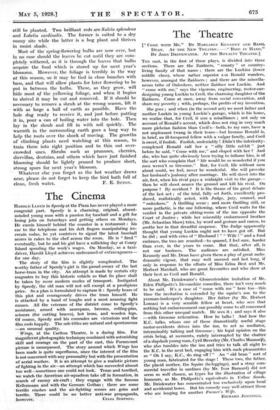The Theatre
[" COME WITH ME." BY MARGARLT KENNEDY AND BASIL DEAN. AT THE NEW THEATRE.—" BIRD IN HAND." BY JOHN DRINKWATER. AT THE ROYALTY THEATRE.] THE cast, in the first of these plays, is divided into three sections. There are the Zaidners, " county " or country- living family of that name ; there are the Luckins (lower middle class), whose rather superior sail Ronald wanders, however, amongst the Zaidners ; and there are the miscella- neous tribe of Onlookers, neither Zaidner nor Luckin. And " come with me," says the vigorous, engineering, motor-car- designing young Luckin to Cecil, the charming daughter of the Zaidners. Come at once, away from social convention, and share my poverty ; with, perhaps, the profits of my invention. She goes ; and when (in the second act) we meet father and mother Luckin in young Luckin's garage, which is his home,
we realize that, for Cecil, it was a misalliance ; not only on account of Ronald's accent, which does not ring in very much more plebeian fashion than Cecil's—both, to my ears, have a not unpleasant twang in their tones—but because Ronald is, in brief, an ill-tempered fellow with a vulgar family, and Cecil is sweet, if foolish. Foolish, undeniably I Didn't the inferiority- complexed Ronald call her a " silly little rabbit " just before he said, " Come with me," and eloped with her ? And she, who has quite obviously been trying to inflame him, is of the sort who complain that " life would be so wonderful if you men weren't so tiresome." But; for Cecil, life without men about could, we feel, never be wonderful. She will provoke her husband's jealousy after marriage. He will shoot into the air, first, when his rival pays a midnight visit to the garage— then he will shoot nearer the ground and kill his rival. On purpose ? By accident ? It is the theme of the great debate of the last act ; of the trial, fully set forth, excellently pro- duced, realistically acted, with Judge, jury, counsel, and " onlookers." A thrilling scene ; and more thrilling still, or more pathetic, is the one following, where Cecil waits for the verdict in the private sitting-room of the inn opposite the Court of Justice ; while her miserably embarrassed brother (Mr. Sebastian Shaw) tries, by word and gesture and caress, to soothe her in that dreadful suspense. The Judge apparently thought that young Luckin ought not to have got off. But he did ; and with cries of " Husband ! " " Wife ! " and a fond embrace, the two are reunited—to quarrel, I feel sure, harder than ever, in the years to come. But that, after all, is not our business. The audience are satisfied. Miss Kennedy and Mr. Dean have given them a play of great melo- dramatic vigour, that may well succeed and last long, if only in response to the efforts of Miss Edna Best and Mr. Herbert Marshall, who are great favourites and who show at their best as Cecil and Ronald.
About Mr. Drinkwater's Gloucestershire imitation of Mr. Eden Phillpotts's Devonshire comedies, there isn't very much to be said. It's a case of " come with me " here too—this time the invitation is extended by the squire's son to the yeoman-innkeeper's daughter. Her father (by Mr. Herbert Lomas) is a very sensible fellow at heart, who sees that nothing but embarrassment can possibly come to all concerned from this other unequal match. He sees it ; and says it also —with tiresome reiteration. How he talks ! And how the K.C. talks, whom one of those dramatically useful stage motor-accidents drives into the inn, to act as mediator, interminably talking and tiresome ; his legal opinion on the crisis being, at moments, rudely interrupted by the chatter of a slapdash young man, Cyril Beverley (Mr. Charles Maunself1), who also tumbles into the inn and tries to talk all night to the K.C. in the next bed, engaging him with such pleasantries as " Oh I say, K.C., do ring off 1" An " old bean " sort of young man, fabricated for the stage ! These two, the father, the placid mother, the Squire (In leggings), and a stray com- mercial traveller in sardines (by Mr. Ivor Barnard) did not seem so well chosen, as types for the illustration of village humours, as Mr. Phillpotts's equivalents in Yellow Sands. Mr. Drinkwater has concentrated too exclusively upon local and accidental bores. But his comedy may well attract those who are longing for another Farmer's Wife.
RICHARD JENNINGS.








































 Previous page
Previous page